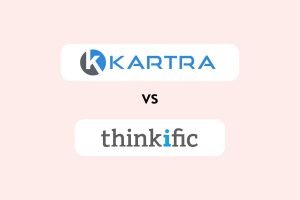Last updated on March 10, 2024
As a coach, you’re not just an expert in your field; you’re also a business owner. And like any business owner, you need the right tools to manage your operations efficiently and effectively.
These business tools for coaches are designed specifically to:
- reduce the time spent on administrative tasks
- enhance client interaction
- facilitate better communication
- helps track payments and expenses
…among many others.
Listed below are 15 of the best ones.
Table of Contents
1. Google Workspace (formerly GSuite)
Google Workspace, formerly known as GSuite, is a collection of cloud-based productivity tools developed by Google.
It includes various applications like:
- Gmail,
- Google Drive,
- Google Docs,
- Google Sheets,
- Google Slides, and
- Google Calendar,
…which you can use to organize workflow, collaborate with clients or team members, and manage documents effectively.
2. Coaching Contract
A coaching contract outlines the terms and conditions of the coaching relationship, including the:
- scope of services,
- duration of the coaching program,
- payment terms,
- confidentiality agreements,
…and other specific expectations and responsibilities
To make things easier for you, The Contract Shop has ready-made contracts and agreements you can use.
3. Forms and Templates
Depending on the niche, various specific forms can be used.
For instance, life coaches might use session checklists or client consent forms. While health and wellness coaches might use food diaries, macro calculators, and mindset technique forms.
There are many resources for coaching forms and templates online, but our personal favorite is The Coaching Tools Company.
They offer a variety of customizable templates, like these free business admin forms, tailored for different coaching needs.
4. DocuSign
DocuSign is particularly useful for executing coaching contracts, consent forms, and other legal documents without the need for physical paperwork. This is perfect for coaches who conduct sessions remotely.
5. Note-Taking Apps
Note-taking apps are essential for coaches to record thoughts, session notes, and follow-up actions.
Popular options include Evernote, Microsoft OneNote, Notion, Obsidian, and Google Keep. Each of them caters to different styles of organizational needs, and whatever you choose depends largely on what you prefer and what fits your practice.

6. Payment Processors
In the era of digital transactions, having a reliable payment processor is non-negotiable.
Tools like Stripe and PayPal have become household names, offering seamless, secure, and efficient payment solutions. They handle everything from invoicing to direct deposits, making the payment process hassle-free for both you and your clients.
7. Typeform
Typeform allows you to create engaging, customized forms and surveys that can significantly enhance client interaction.
Whether it’s a pre-coaching questionnaire, a feedback form, or a post-session survey, Typeform’s sleek design and easy-to-use interface make it a favorite.
Google Forms is another popular option, but Typeform allows for more creativity plus tons of templates you can use for free.
8. SWOT Analysis
As coaches, we often encourage our clients to reflect on theirs strengths and weaknesses and the opportunities and threats in their lives. But how often do we apply this to our own coaching practice?
Utilizing SWOT Analysis helps us identify areas where we excel and aspects that need improvement. It guides us in recognizing opportunities for growth and potential challenges in the market.
9. Goal Setting Tools
As coaches, setting and achieving goals is at the heart of what we do. Tools like Trello, Asana, or even simple Gantt charts can be instrumental in mapping out goals, both for ourselves and our clients.
These tools help break down larger objectives into manageable tasks, track progress, and maintain accountability.
If you’re looking for simple but effective goal-setting templates, check out:
- Weekly & Daily To-Do List Action Planner
- Monthly Action Tracker
- Quarterly Goals-at-a-Glance Tool
- Annual Business Goals Planner

10. Dropbox
Dropbox offers a centralized platform where you can share, store, and access all your files from anywhere, at any time.
It’s not just about storage; it’s about having a secure, organized, and easily accessible repository for all your coaching materials.
Whether it’s sharing session worksheets with clients or accessing your coaching notes on the go, Dropbox ensures you have everything you need at your fingertips.
11. Harvest
As coaches, keeping track of time spent with clients and managing billing can be quite a task. Harvest simplifies this by allowing you to track time per client session, create professional invoices, and even manage project budgets.
With Harvest, you can spend less time on administrative tasks and more on what you do best—coaching.
12. Business Registration Kit
Business Registration Kit might seem like a one-time tool, but it’s a critical step in legitimizing your coaching practice.
This kit typically includes everything you need to legally establish your business, such as:
- registering your business name
- obtaining necessary licenses
- understanding tax obligations
If you’re a solo coach or entrepreneur looking for legal help, check out Lisa Fraley’s website.
13. Website Builders
You don’t need to be a tech wizard to build your own website. You also don’t need to avail expensive services from a professional. You can simply log in to platforms like WordPress or Squarespace to get started.
These user-friendly website builders offer a plethora of customizable templates that cater to various styles and needs.
If WordPress and Squarespace don’t quite fit your needs, check out this article. And if you need inspiration, we’ve also compiled a list of best coaching websites.
14. Bookkeeping
Then there’s bookkeeping—not the most glamorous aspect of running a business, but undeniably important.
Tools like QuickBooks or FreshBooks offer simple yet comprehensive solutions for managing your finances. From tracking expenses and income to preparing for tax season, these tools keep your financial health in check.
You can head to our Bonsai vs FreshBooks article for a full list of features and an overview of the advantages of using FreshBooks.
15. Business Management Software
Last but not least, Business Management Software.
To streamline your business operations, you can either:
- integrate different apps and platforms to your system, or
- use an all-in-one business management software.
Tools like Zoho or HubSpot provide an all-in-one solution to manage various aspects of your coaching business. These platforms integrate CRM (Customer Relationship Management), project management, email marketing, and more into a single interface.
For a coaching business, this means viewing client interactions, marketing efforts, and business performance without having to open ten tabs at once.
Don’t know what software to use? Check out the best life coaching software in 2024.
16. Books on Building a Coaching Business
Learning from those who have been in your shoes can spare you from the pitfalls of trial and error. That’s why books with insights on how to launch and run a coaching business are a valuable resource.
They can offer knowledge, tips, strategies, and motivation when you need a little pick-me-up. During challenging moments, they can make you feel less alone, and at the same time, they impart knowledge on optimizing your revenue.
If you want a book recommendation, refer to our list of the best books on building a coaching business.
17. Podcasts on Building a Coaching Business
Listening to podcasts is like having a chat with an expert coach. You can pick up practical tips, find out the industry’s latest updates, and receive guidance just by plugging in your earbuds and pressing play.
Podcasts that talk about the business aspects of coaching include Business Coaching Secrets, The Life Coach Business Podcast, and The Hell Yes Entrepreneur.
Find out more amazing coaching podcasts here.
Conclusion
As coaches, we are committed to the growth and development of our clients. However, to do this effectively, we must also invest in our growth and the efficiency of our practices.
By leveraging the right mix of educational resources and practical tools, we can not only enhance our coaching skills but also manage our businesses more effectively.
We hope this list helped! If you’re on the lookout for other coaching tools to use, check out these articles:
- Best free life coaching tools
- Best spiritual coaching tools
- Best Law of Attraction coaching tools
- Best business coaching tools
The Life Coach Magazine staff is your team for high-quality content on topics from personal development, to coaching tips, to how to grow your coaching business.

















Be First to Comment